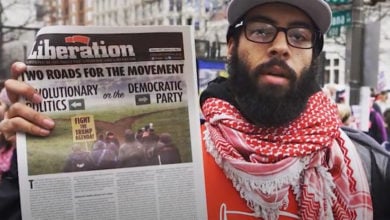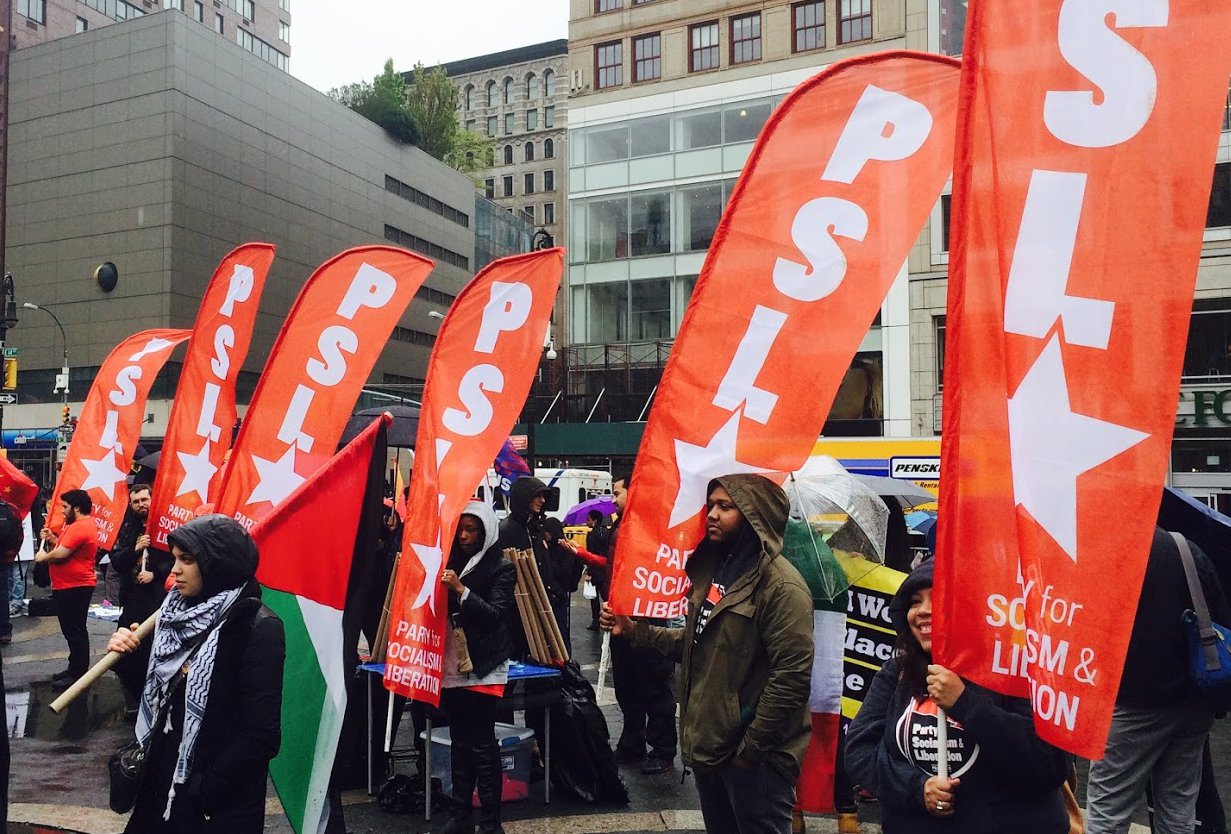Following
is a talk given in a panel titled “The class struggle in Africa and the fight
against imperialism” at the Nov. 13-14, 2010, National Conference on Socialism
sponsored by the Party for Socialism and Liberation.
What do we mean precisely when we collectively
discuss the class struggle in Africa? What is the context of Africa’s determination
to overcome the treacherous legacy of colonialism? What are all the meaningful
variables in which we define the very necessary continent-wide fight against
imperialism? It is important for us to reconfigure this discourse pointedly and
to firmly place it within the revolutionary context. The significant point that
must be made– and unequivocally stated – is that the ascendancy of capitalism, particularly in Western Europe
and the United States, was founded on the basis of widely recognized crimes:
the crime of transatlantic slave trade, the crime of genocidal wars of conquest
and the crime of pernicious
extraction of natural recourses.
We must together dismantle the prevailing bourgeois
orthodoxy that Africa has no history, no development of science, no
understanding of art and culture. Contextually speaking, the central dictates
of reason and logic have fully determined that these characterizations are
maliciously false. There is no denying that pre-colonial Africa possessed
perhaps as many as 10,000 different states and developed various parameters of
political organization and rule. These included small family groups of
hunter-gatherers such as the San people of southern Africa; larger, more
structured groups, such as the family clan groupings of the Bantu-speaking
people of central and southern Africa; heavily structured clan groups in the
Horn of Africa; the large Sahelian kingdoms; and autonomous city-states and
kingdoms such as those of the Yoruba and Igbo people in West Africa and the
Swahili coastal towns of East Africa. By the 9th century in the Common Era (CE) a string of
dynastic states, including the earliest Hausa states, stretched across the
sub-Saharan savannah from the western regions to central Sudan. The most
powerful of these states were Ghana, Gao and the Kanem-Bornu. Ghana declined in
the 11th century C.E but was succeeded by the Mali kingdom, which consolidated
much of western Sudan in the 13th century CE.
In the forested regions of the West African coast,
independent kingdoms were established. The Kingdom of Nri of Igbo came into
being around the 9th century CE and was one of the first. It is also one of the
oldest kingdoms in modern day Nigeria and was ruled by the Eze Nri. The Nri
kingdom is famous for its elaborate bronzes, found at the town of Igbo Ukwu.
The bronzes have been dated from as far back as the 9th century. The Almoravids
were a Berber dynasty from the Sahara that spread over a wide area of
northwestern Africa and the Iberian peninsula during the 11th century. The Banu
Hilal and Banu Ma’qil were a collection of Arab Bedouin tribes from the Arabian
Peninsula who migrated westwards via Egypt between the 11th and 13th centuries
CE.
Following the breakup of Mali a local leader named Sonni
Ali (1464–1492) founded the Songhai Kingdom in the region of middle Niger and
the western Sudan, and took control of the trans-Saharan trade. By the 11th
century CE some Hausa states – such as Kano, Jigawa, Katsina and Gobir – had
developed into walled towns engaging in trade, servicing caravans and
manufacturing goods. Until the 15th century CE, these small states were on the
periphery of the major Sudanic empires of the era, paying tribute to Songhai to
the west and Kanem-Borno to the east. Even though
the focus of our conversation has been in Western and Northern Africa, it is
noteworthy to articulate that Continental Africa had the earliest development
of agriculture and iron smelting, and the most diverse amount of written text
in the world.
The ideological development of capitalism
revolved around the famous three “Cs”: the so-called “civilization” of the Africans,
Christianization, and Commerce (i.e., trade). So if you are civilized and
Christian, then you have trade. The
earliest forms of global corporations had their focus, as mercantile firms, on
global expansion. Thus mercantile firms such as the Dutch East India Company,
the British East Africa Company, the British South Africa Company, and Cadbury,
etc. realized early on that control of the global sources of raw materials, minerals,
spices and agricultural produce was essential to their national status in a
period of intense competition in Europe. These sources of raw materials were in
Asia, Africa and Latin America.
The great mercantile empires of Spain and
Portugal lost their advantage in this global competition due to the dominance
of their parasitic nobility and the Catholic Church, and the relative weakness
of their emergent bourgeoisie. Holland, France and England benefited from
rapidly emerging merchant classes that could move the economic foundations of
their countries beyond mercantilism towards capitalist production. African
populations were turned into commodity traders dealing in exotic goods from the
African interior, including gold and ivory, but most importantly in the
commodity trade of human beings. Tens of millions of the economically most able
Africans were traded from both African West and East Coasts to supply
plantation labor in the Caribbean and in North, Central and South America.
The
concept of colonization was consolidated as a matter
of policy on August 3, 1875, when the term terra nullius, which essentially means “land
belonging to no one” or “no man’s land,” was introduced as a resolution. The central premise revolved around the notion that a people and
their ancestral land was never subject to sovereignty. This gave the impetus
for settlers to occupy South Africa, Namibia, Botswana, Zimbabwe, Angola,
Zambia, Malawi, Mozambique, Tanzania, Uganda and Kenya, and we see this
globally with Palestine, the Americas, the continent of Australia, New Zealand
and the South Pacific. The pretext for the Berlin Conference was on the
supposed control of the slave trade and promoting humanitarian idealism. The
conference only passed empty resolutions about ending the slave trade and
providing for the welfare of Africa. We must keep in mind that no Africans were
represented at this conference.
Article 34 of the Berlin Act states that any
European nation that took possession of an African coast, or named themselves
as “protectorate” of one, had to inform the other powers of the Berlin Act of
this action. If this was not done, their claim would not be recognized. This
article introduced the “spheres of influence” doctrine. The control of a coast
also meant that they would control the hinterland to an almost unlimited
distance.
Article 35 determined that in order to occupy a
coastal possession, the nation also had to prove that they controlled
sufficient authority there to protect existing rights, such as freedom of trade
and transit. This was called the doctrine of “effective occupation” and it made
the conquest of Africa a less bloody process.
The overriding objective of the conference was to
facilitate the aforementioned “effective occupation” of conquered lands, which in
turn ensured that the division of Africa would take place without war among the
European powers. The
Berlin Conference of 1884 ignored the complex ethnic, cultural and language
realities of Africa, and arbitrarily divided the continent. This created optimal
conditions for capital accumulation as the indigenous populations could be
divided and ruled within a geographically defined area, privileging some ethnic
or language groups over others, thus obstructing the development of class
consciousness amongst workers.
The
inhumanity of the Berlin Conference was the pivotal factor in the hastening of
national liberation struggles that sprung up throughout Africa in the 20th
century. Now, we must duly note the present conditions and be cognizant of the
intricate manner in which the African political and socio-economic realities
are interwoven with global capitalism. There is, without question, a
substantive need to continue to agitate for the importance of international
working-class solidarity.
In
closing, some may say that the road ahead is arduous, riddled with peril, but
rest assured sisters and brothers that we, as the converging masses, will not
wait, we will not succumb, and we will not submit our convictions to this dying
despotic capitalist system. The capitalists know that their time is measured
and they also know that they will be soundly defeated. Join us in this most
beautiful of struggles.





